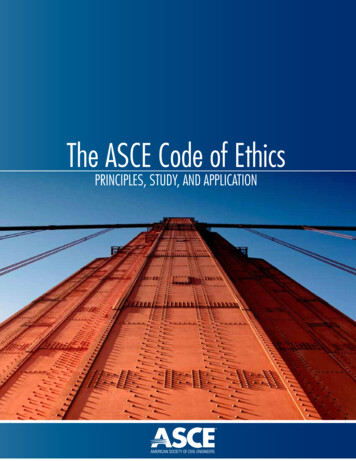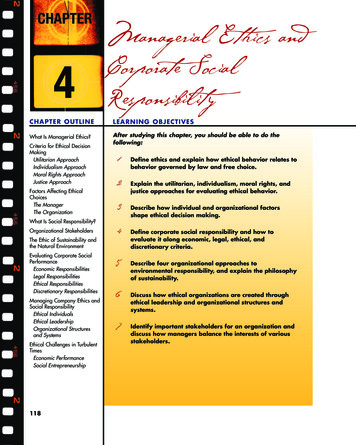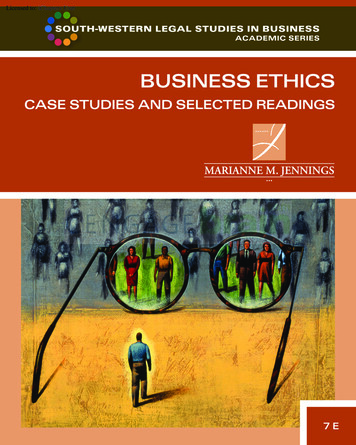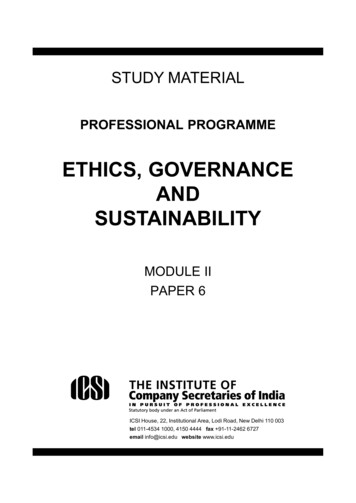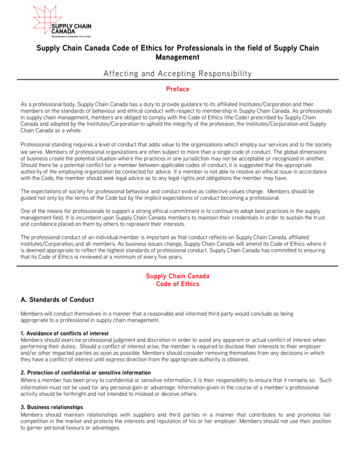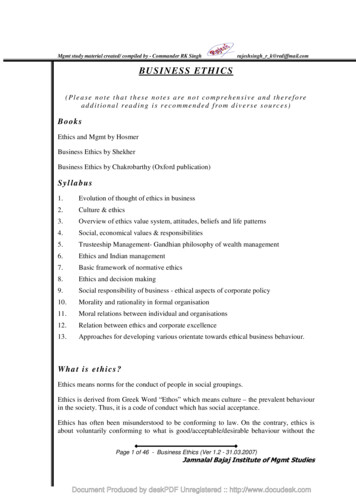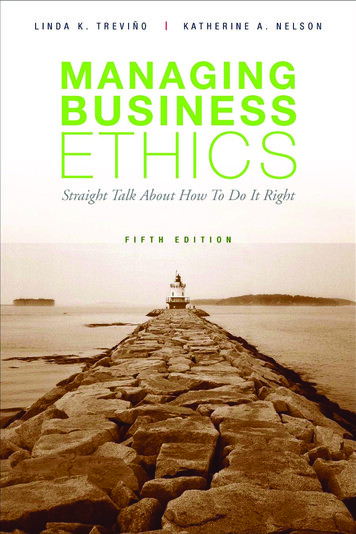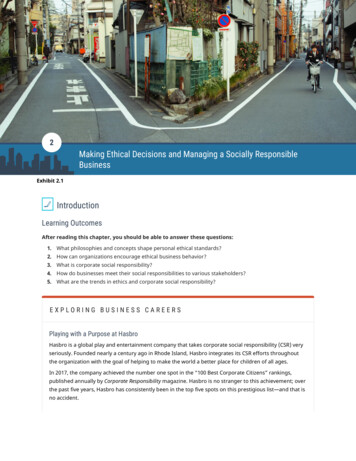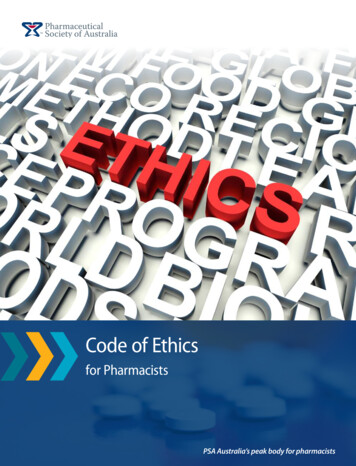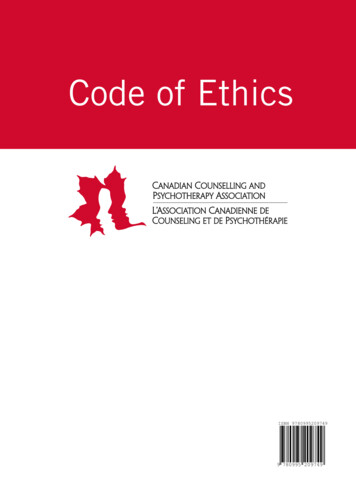
Transcription
Code of EthicsISBN 97809952097499 780995 209749
Code of EthicsThe Code of Ethics (1999) was developed by a Canadian Counselling and PsychotherapyAssociation (CCPA) Committee consisting of:Glenn W. Sheppard - Co-ChairWilliam E. Schulz - Co-ChairSylvia-Anne McMahonThe Code of Ethics (1999) was subsequently updated in 2007 by Glenn W. Sheppard andWilliam E. Schulz.The revisions in this 2020 Code of Ethics were prepared by a Canadian Counselling andPsychotherapy Association (CCPA) Committee consisting of:Lorna Martin – ChairJean BlacklerLouise BlanchardJonas BreuhanCorrine Hendricken-EldershawGlenn Sheppard – Ethics AmicusTina NashSimon NuttgensKathy Offet-GartnerShelley SkeltonThe Committee would like to thank CCPA’s National Office, particularly Kim Hollihan, and themany contributors and reviewers to this living document.Approved by CCPA Board of Directors, March 2020Canadian Counselling and Psychotherapy Association202-245 Menten PlaceOttawa, ON, K2H 9E8Fax: (613) 237-9786Toll free: 1-877-765-5565Web: www.ccpa-accp.ca Copyright 2020. Canadian Counselling and Psychotherapy Association
Canadian Counselling and Psychotherapy Association202 - 245 Menten PlaceOttawa, ON, K2H 9E8ISBN: 978-0-9952097-4-9Printed in Canada
itable of contentsTable of ContentsCode of EthicsPreamble.iiiThe Revision Process.iiiContext .iiiPhases of Revision. ivCommitment to a Living, Cross-Referenced Document .vIntroduction.1Ethical Principles.2The CCPA Process of Ethical Decision-Making.31. Principle-Based Ethical Decision-Making .32. Virtue-Based Ethical Decision-Making .43. Quick Check .44. Wise Practices Lens .5A. Professional Responsibility.6B. Counselling / Therapy Responsibilities.9C. Assessment and Evaluation.14D. Professional Research and Knowledge Translation.17E. Clinical Supervision Services .20F. Consultation Services.24G. Counsellor / Therapist Education and Training.25H. Use of Electronic and Other Technologies .28I. Indigenous Peoples, Communities and Contexts .30Glossary of Terms.33
iinotesNotes:The terms therapy/therapist have been used throughout this document asgeneric activities/titles that encompasses a variety of professional activitiesand titles used by practitioners engaged in counselling and psychotherapyin Canada.The articles (e.g., A1, C5, G2) contained within the Code of Ethics aredesigned to function as an integrated set of principles. Cross-referencinghas been included in the document to assist readers in locating the mostcommonly occurring combinations of articles to support informed ethicalpractice. The Standards of Practice are also cross-referenced to the Codeof Ethics.Words followed by the superscript symbol ǂ are defined in the Glossary ofTerms at the conclusion of the Code of Ethics.
iiiPreamblePreambleThe Code of Ethics for the Canadian Counselling and Psychotherapy Association is aliving document. Between revisions to the Code, feedback from members is acceptedand compiled in preparation for reviews, updates, additions, and amendments.The Revision ProcessApproximately every five years, the Canadian Counselling and PsychotherapyAssociation publishes a call for Task Group members to undertake a data-informedreview and revision of the existing Code of Ethics and Standards of Practice. Themembership of the Task Group is strategically diverse, including scholars, practitioners,educators, ethics experts, and representatives of special interest groups, among others.ContextThe Task Group determined that one of the most important adjustments to the Codeof Ethics in 2020 would be to include several new sections, one of which was a sectionto draw attention to important concepts and contexts addressed by the Truth andReconciliation Commission. The Group wished to begin a process of development thatcould ensure that CCPA members understood the ethical imperative to seek knowledgeand understanding and commit to self-reflection before engaging with Indigenousclients and communities. The criticality of cultural humility and recognition of culturalblindness were focal points in locating relevant research by Indigenous scholars andexperts to assist with the process. Consultation with Elders and knowledge-keepers wasprominent in the preferred update and review process.Within the mandate of development and revision, the Task Group chose to strengthenexisting and incorporate new articles of ethics that more clearly addressed concernsrelated to: Working with Indigenous clients and communities; Working with persons who identify (for a variety of reasons) as marginalized,vulnerable, or disadvantaged; Working with clients using new technologies; Working with or as a supervisor or consultant.Since the last revision of the CCPA Code of Ethics, there have been major shifts in theuse of technology in the counselling and psychotherapy profession as well as changes inCanadian demographics and social, political, economic, and cultural awareness. Thereis therefore a renewed focus on these elements in the revised Code and those related tosocial justice, self-reflection, and diversityǂ.
PreambleivPhases of RevisionThe first step in the revision process involves the dissemination and review of existingcodes of ethics in counselling and psychotherapy related professions from around theworld. Scholarly articles and other research focused on ethics and consultations withknown experts or persons with lived experience are sought out by individual TaskGroup members and are considered by the full Task Group.The second step in the revision process involves members of the Task Group assemblingin small groups to make recommendations pertaining to additions, deletions, andadjustments to the Code of Ethics. The proposed revisions are then distributed to the fullTask Group.The third step in the revision process is a full group review of the work of thesub-groups. The proposed revisions are reviewed with respect to style and content. Stylerefers to semantic clarity and grammatical and syntactical accuracy. Content reviewfocuses on completeness and correctness of concepts presented; analysis of potentialomissions and overlap; and alignment with CCPA bylaws and Canadian statutes.Once the Task Group believes a first draft is ready for internal review by CCPA ChapterPresidents, Chairs of CCPA-associated committees, and National Office personnel,the first phase of review is undertaken. The preliminary draft of the revised Code istransmitted for feedback.The feedback from the first phase of review is considered line by line by the Task Group.Additions, deletions, amendments, and further research are undertaken to address theneeds identified in the first phase of feedback. Once revisions have been approved by theTask Group and incorporated, the next phase of review is undertaken.The second phase of review is extended to a broader group of reviewers associated withthe counselling and psychotherapy profession. The feedback from the second phaseof review is considered by the Task Group using the same processes as the first phase.Revisions are approved and made by the Task Group, leading to the third and finalphase of review.In the third phase of review, the proposed Code of Ethics is presented to the CCPABoard of Directors for its approval.Upon confirmation of final approval of the revisions to the Code of Ethics, the TaskGroup draws upon the revised document to guide revisions to CCPA's Standards ofPractice. A similar process of multi-phase review and feedback is undertaken.
PreambleCommitment to a Living, Cross-Referenced DocumentCCPA is committed to the concept of living documents with respect to the Code ofEthics and Standards of Practice. This commitment includes ongoing cross-referencingwithin the Code of Ethics and between the Code of Ethics and Standards of Practice toensure currency and consistency. A glossary of terms has been included in the revisedCode of Ethics to clarify commonly used terminology.CCPA is also committed to the use of technology to enhance and further develop theCode of Ethics and Standards of Practice. Electronic versions of the documents containhyperlinks to allow readers quick access to cross-referenced components.v
1IntroductionIntroductionThis Code of Ethics expresses the ethical principles and values of the CanadianCounselling and Psychotherapy Association and serves as a guide to the professionalconduct of all its members. It also informs the public, which they serve, of the standardsof ethical conduct that members are responsible to uphold and for which they are heldaccountable. The Code reflects such values as integrity, competence and responsibilitywith an understanding of and respect for the cultural diversity, systemic issues, and thesocial contexts in Canada. It is part of a social contract, based on attitudes of mutualrespect and trust, by which society supports the autonomy of the profession in returnfor the commitment of its members to act ethically in the provision of professionalservices. The Code of Ethics is designed to be used in combination with the Standards ofPractice as well as other sources of information such as recent literature and research,legal statutes, cultural knowledge keepers, and other practice guidelines.Members of CCPA have a responsibility to ensure that they are familiar with this Codeof Ethics, to understand its application to their professional conduct, and to strive toadhere to its principles and values. Counsellors/therapists should also use the CCPAProfessional Standards of Practice, as well as other sources of information to assist them inmaking informed professional decisions. These sources of information include the laws,regulations, and policies, that are professionally relevant to their working environment.Members are accountable to both the public and their professional peers and aretherefore subject to the complaints and disciplinary procedures of the CanadianCounselling and Psychotherapy Association. Violations of this Code, however, do notautomatically imply legal liability. Such a determination can only be made by legal andjudicial proceedings. This peer review process is intended to enable the Association toadvise and to discipline its members in response to substantiated complaints originatingeither with professional peers or the public.Although a code of ethics is essential to the maintenance of ethical integrity andaccountability, it cannot be a substitute for the active process of ethical decisionmaking. Members increasingly confront challenging ethical demands and dilemmas ina complex and dynamic society to which a simple and direct application of this codemay not be possible. Also, reasonable differences of opinion can and do exist amongmembers with respect to how ethical principles and values should be rank ordered whenthey are in conflict. Therefore, members must develop the ability and the courage toexercise a high level of ethical judgment. For these reasons, the Code includes a sectionon ethical decision-making.This Code is not a static document but will need revisions over time because of thecontinuing development of ethical knowledge and the emergence of consensus onchallenging ethical issues. Therefore, members and others, including members ofthe public, are invited to submit comments and suggestions at any time to CCPA bycontacting the National Office at https://www.ccpa-accp.ca/contact-us/.
2ethical principlesEthical PrinciplesThe expectations for ethical conduct as expressed in this Code are based on thefollowing fundamental principles:a) Beneficence- Being proactive in promoting the best interests of clients.b) Fidelity- Honouring commitments to clients and maintaining integrityin counselling relationships.c) Nonmaleficence- Refraining from actions that risk harm and not willfullyharming clients.d) Autonomy- Respecting the rights of clients to agency andself-determination.e) Justice- Respecting the dignity of all persons and honouring their rightto just treatment.f) Societal Interest- Upholding responsibility to act in the best interests of society.
the ccpa process of ethical decision-makingThe CCPA Process of Ethical Decision-MakingThis brief overview of approaches to the process of ethical decision-making is providedto offer direction to counsellors/therapists when faced with making ethical decisionsand resolving ethical dilemmas.1. Principle-Based Ethical Decision-MakingStep One– What are the key issues in this situation?Step Two– What ethical articles from the CCPA Code of Ethics are relevant to thissituation?– Are there policies, case law, statutes, regulations, bylaws or other relatedarticles that are relevant to this situation?Step Three – Which of the six ethical principles are of major importance in thissituation? (This step also involves securing additional information,consulting with knowledgeable colleagues or the CCPA EthicsCommittee, and examining the probable outcomes of various courses ofaction.)Step Four– How can the relevant ethical articles be applied in this circumstance?– How might any conflict between ethical principles be resolved?– What are the potential risks and benefits of this application andresolution?Step Five– What do my feelings and intuitions tell me to do in this situation?(See also Virtue-Based Ethical Decision-Making.)Step Six– What plan of action will be most helpful in this situation?– Follow up to evaluate the appropriateness, adequacy, and effectivenessof the course of action taken. Identify any adjustments necessary tooptimize the outcome.3
the ccpa process of ethical decision-making2. Virtue-Based Ethical Decision-MakingA virtue ethics approach is based on a belief that counsellors/therapists asvirtuous persons have the ability to make ethical decisions that are informedby their understanding of the interests of others, a capacity to subordinate self-interestin the pursuit of just outcomes, an acceptance of complexity, and a commitment tonatural justice. Although there is no step-by-step methodology for this approach, thefollowing questions may help with the process of context-specific, virtue-based ethicaldecision making:1. What emotions and intuition am I aware of as I consider this ethical dilemma andwhat are they telling me to do?2. How can my values best show care for the client’s wellbeing?3. How will my decision affect other relevant individuals in this ethical dilemma?4. What decision would I feel best about publicizing?5. What decision would best reflect who I am as a person and practitioner withincultural/intercultural contexts?3. Quick Check1. Publicity ould I want this ethical decision announced on the front pageWof a major newspaper?2. Universality Would I make the same decision for everyone? If everycounsellor/therapist made this decision, would it be a good thing?3. JusticeIs everyone being treated fairly by my decision?4
the ccpa process of ethical decision-making4. Wise Practices LensCounsellors/therapists are encouraged to approach all ways of knowing when engagingin decision-making. Using Etuaptmumk2 (two-eyed seeing) is of immense assistance.This way of perceiving situations refers to “learning to see from one eye with thestrengths of Indigenous knowledges and ways of knowing and from the other eye withthe strength of Western knowledges and ways of knowing and learning to use botheyes together for the benefit of all.” (Marshall, A., 2004, dSeeing/).Richard Wagamese, of the Ojibway Nation, reminds readers of the importance ofrelationship in decision-making:We are born into a state of relationship, and our ceremonies and rituals areguides to lead us deeper into that relationship with all things. The big lesson?Relationships never end; they just change. In believing that lies the freedom tocarry compassion, empathy, love, kindness and respect into and through whateverchanges. We are made more by that practice. (Wagamese, R., 2016, p. 44).The “wise practices lens” model of decision-making (Wesley-Esquimaux & Snowball,2010, p. 230) is a decision-making strategy that practitioners may find helpful. Themodel uses teachings from the seven sacred values that include courage, honesty,humility, respect, truth, love, and wisdom (Baskin, 2007).For a more comprehensive treatment of ethical decision-making, members are directedto the CCPA publication, Counselling Ethics: Issues and Cases, available from the CCPANational Office.2Pronounciation: ad oo apt mumk5
A. Professional Responsibility6A. Professional ResponsibilityCounsellors/therapists are expected to conduct themselves with integrity,professionalism, and ethical care in all aspects of their work with clients, clients'families, colleagues, communities, and the public. This responsibility includes engagingin appropriate, contextualized professional development and self-care practices tomaintain optimum capacity.A1. General ResponsibilityCounsellors/therapists maintain high standards of professional competence and ethicalbehaviour and recognize the need for continuing education and personal care in orderto meet this responsibility. (See also C1, E1, E11, F1, G2, Section I)A2. Respect for RightsCounsellors/therapists participate in only those practices that are respectful of thelegal, civic, moral, and human rights of themselves and others, and act to safeguardthe dignity and rights of their clients, students, supervisees, and research participants.(See also D1, D9, E1, Section I)A3. Boundaries of CompetenceCounsellors/therapists limit their counselling/therapy services and practices to thosewhich are within their professional competence by virtue of their education andprofessional experience, and consistent with any requirements for provincial/territorialand national credentials. They seek supervisionǂ, consult with and/or refer to otherprofessionals when the counselling needs of clients exceed their level of competence.(See also C3, C4, D1, E4, E6, F1, F2, G2, G14, H4, Section I)A4. Supervision and ConsultationCounsellors/therapists seek supervisionǂ and consultationǂ across the career spanto support and enrich their ongoing professional development. Supervisionǂ andconsultationǂ are warranted especially when counsellors/therapists are confrontedwith dilemmas or uncertainties, and when they are developing a new practice area orupdating knowledge and skills related to a former area of practice. (See also B10, C4,C7, Section E, Section F, I5, I9, I10)A5. Representation of Professional QualificationsCounsellors/therapists claim or imply only those professional qualifications thatthey possess and are responsible for correcting any known misrepresentation of theirqualifications by others. Counsellors/therapists working in a province or territory withprofessional statutory regulation ensure they adhere to the specific representation ofprofessional qualifications requirements that have been mandated by statute and/orRegulatory College bylaw. (See also H7, I5)
A. Professional Responsibility7A6. Professionalism in AdvertisingCounsellors/therapists when advertising and representing themselves publicly, do soin a manner that accurately and clearly informs the public of their services and areas ofexpertise. Counsellors/therapists belonging to a statutory regulatory college additionallyadhere to the specific advertisement requirements as mandated by statute and/orRegulatory College bylaw.A7. Responsibility to Counsellors/Therapists and Other ProfessionalsCounsellors/therapists demonstrate ethical conduct, integrity, and professionalismin interactions with counsellor/therapist colleagues and with members of otherprofessional disciplines. (See also Section I)A8. Responsibility to Address Concerns About the Ethical Conduct ofAnother ProfessionalCounsellors/therapists have an obligation when they have serious doubts as to theethical behaviour of another helping professional, whether that individual is a CCPAmember or a member of another professional body, to respectfully address the concernand seek an informal resolution with the counsellor/therapist, when feasible andappropriate. When an informal resolution is not appropriate, legal, or feasible, or isunsuccessful, counsellors/therapists report their concerns to the relevant professionalbody. Counsellors/therapists consider whether there are any legally mandatoryreporting obligations regarding the conduct of the helping professional to takeappropriate action. (See also E4, E5)A9. Supporting Clients When Ethical Concerns AriseWhen counsellors/therapists have reasonable grounds to believe that a client has anethical concern or complaint about the conduct of a CCPA member (including oneself)or members of another professional body, counsellors/therapists inform the client oftheir rights and options with respect to addressing the concerns. When the concernregards a CCPA member, the counsellor/therapist informs the client of the CCPAProcedures for Processing Complaints of Ethical Violations and how to access theseprocedures.A10. Third Party ReportingWhen counsellors/therapists are required or expected to share counselling/therapyinformation with third parties, they ensure that details are discussed and documentedwith clients as part of the initial and ongoing informed consent, including the natureof information to be shared, with whom it will be shared, and when. Counsellors/therapists determine whether a formal, signed consent for release of information formis warranted. (See also B18, C8, D5, E2)
A. Professional Responsibility8A11. Sexual HarassmentCounsellors/therapists do not condone or engage in sexual harassment in theworkplace, with colleagues, students, supervisees, clients, or others. These encountersmay be verbal, pictorial, written comments (including but not exclusive of texting,messaging, taking photos, making posts and comments on websites, Twitter, or otherplatforms), gestures, unwanted sexual images, or physical contacts of a sexual nature.(See also G11, G12)A12. Diversity ResponsivenessCounsellors/therapists continually seek to enhance their diversityǂ awareness,sensitivity, responsiveness, and competence with respect to their own self-identities andthose of their clients. They are attuned to various effects related to diversityǂ and howthey may influence interactions with clients. (See also B9, C10, D9, E7, E12, Section I)A13. Extension of Ethical ResponsibilitiesCounselling/therapy services and products provided by counsellors/therapists throughclassroom instruction, public lectures, demonstrations, publications, radio andtelevision broadcasts, computer technology, and other media must meet the appropriateethical standards consistent with this Code of Ethics. (See also I5, I10)A14. Professional Will and Client File DirectiveCounsellors/therapists undertake to establish a formal stand-alone agreement with aqualified practitioner to serve as executor whose sole responsibility will be to fulfil anyethical obligations including the management of client records should their practice enddue to death, or incapacitation such that they are unable to do so.
B. Counselling / therapy responsibilities9B. Counselling / Therapy ResponsibilitiesThe specific responsibilities of counsellors/therapists vary across time and multiplegeographic, environmental, social, cultural, economic, and political contexts. Despitethe variety of situations in which counsellors/therapists may find themselves, theirresponsibility for safeguarding the welfare of clients, maintaining their trust, andprotecting their personal data is constant across time and consistent across contexts.B1. Primary ResponsibilityCounsellors/therapists respect the integrity and promote the welfare of their clients.They work collaboratively with clients to devise counselling/therapy plans consistentwith the needs, abilities, circumstances, values, cultural, or contextual background ofclients. (See also C1, D2, E1, E4, Section I)B2. ConfidentialityCounselling/therapeutic relationships and information resulting therefrom are keptconfidential. However, there are the following exceptions to confidentiality: (i) whendisclosure is required to prevent clear and imminent danger to the client or others;(ii) when levels of jurisprudence demand that confidential material be revealed;(iii) when a child is in need of protection; (iv) persons with diminished capacity, andas otherwise mandated by municipal, provincial/territorial, and federal law. (See alsoB4, B6, B13, B18, C5, D5, D8, E10, G7, H1, H4, H6)B3. Duty to WarnWhen counsellors/therapists become aware of the intention or potential of clients to placeothers in clear and imminent danger, they use reasonable care to give threatened personssuch warnings as are essential to avert foreseeable dangers. In cases in which it may notbe appropriate or safe for counsellors/therapists to intervene directly to give warnings tothreatened persons, they take appropriate steps to inform authorities to take action.B4. Client's Rights and Informed ConsentWhen counselling/therapy is initiated, and throughout the counselling/therapy processas necessary, counsellors/therapists inform clients of the purposes, goals, techniques,procedures, limitations, potential risks and benefits of services to be performed, and othersuch pertinent information that supports the informed decision-making process.Counsellors/therapists make sure that clients understand the implications of diagnosis,fees and fee collection arrangements, record-keeping, and limits of confidentiality.Clients have the right to collaborate in the development and evolution of the counselling/therapy plan. Clients have the right to seek a second opinion or consultation, to refuse anyrecommended services, and to be advised of the consequences of such refusal. (See alsoB2, B5, B8, B15, B18, C2, D3, D4, E2, G10, H1, H2, H3, H4)
B. Counselling / therapy responsibilities10B5. Children and Persons with Diminished CapacityWhen working with children and/or persons with diminished capacity, counsellors/therapists conduct the informed consent process with those who are legally entitledto offer consent on the client’s behalf, typically parents or others appointed as legalguardians. Counsellors/therapists also seek the client’s assent to the proposed servicesor involvement, proportionate with the client’s capacity to do so. Counsellors/therapistsunderstand that the parental or guardian right to consent on behalf of childrendiminishes commensurate with the child's growing capacity to provide informedconsent. These dual processes of obtaining parental/guardian informed consent andclient assent apply to assessment, counselling/therapy, research participation, and otherprofessional activities. (See also B4, D4)B6. Maintenance of RecordsCounsellors/therapists maintain records with sufficient detail and clarity to track thenature and sequence of professional services rendered. They ensure that the contentand style are consistent with any legal, regulatory, agency, or institutional requirements.Counsellors/therapists secure the safety of such records and create, maintain, transfer,and dispose of them in a manner compliant with the requirements of confidentiality andthe other articles of this Code of Ethics. (See also B2, B18, H1, H2)B7. Access to RecordsCounsellors/therapists understand that clients have a right of access to theircounselling/therapy records, and that disclosure to others of information from theserecords only occurs with the written consent of the client and/or when required by law.(See also B4, H1)B8. Multiple RelationshipsMultiple relationships are avoided unless justified by the nature of the activity,limited by time and context, and entered into with the informed consentof the parties involved after assessment of the rationale, risks, benefits, andalternative options.Counsellors/therapists make every effort to avoid or address and carefullymanage multiple r
members with respect to how ethical principles and values should be rank ordered when they are in conflict. Therefore, members must develop the ability and the courage to exercise a high level of ethical judgment. For these reasons
